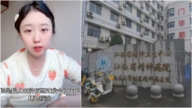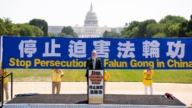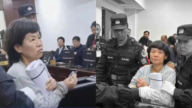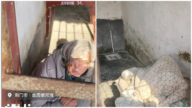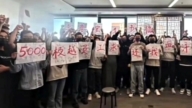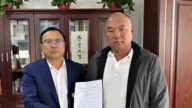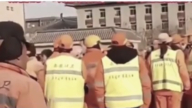【新唐人2013年04月06日讯】中国传统的清明节,在北京的一批维权人士和访民,前往祭奠支持“六四民运”的前中共领导人赵紫阳、和“六四”死难者及北京青年“杨佳”。民众祭奠赵紫阳没有遭到太大阻碍,但祭奠被网友称为侠士、刀客的“杨佳”时,派出所警力带走了6名艺术家和30多名访民。请看以下这则报导。
据《维权网》报导,今年清明节,前往北京富强胡同“赵紫阳故居”祭奠赵紫阳的人士,刚开始被把守胡同的人员阻拦,但民众坚决前往。最后,民众获得放行。此后,再没有人阻拦。
前往“赵紫阳故居”祭奠赵紫阳的人士,包括民主、维权人士,和在京上访的各地访民。
北京维权人士徐香玉表示,她们做了鲜花等祭品,8点多钟就给赵老送过去。
北京维权人士徐香玉:“现在尤其我们这儿,有法不依,而且司法不独立,给老百姓造成了好多的冤情,像抢房子、抢地的。尤其像我们这个被抢了七年了,而且我的官司都赢了,我拿着生效的《法律调解书》都不给我执行。”
徐香玉在赵紫阳故居——富强胡同6号,待了半个小时左右。她估算,来祭奠赵紫阳的,大概有200号人。
徐香玉表示,在赵的故居门外不远处,就有很多警察和警车,还有便衣在拍照,也有一批戴着“红箍”的人值守。但她认为,祭奠赵紫阳的人当中,也有为自己维权超过10年、20多年的访民,绝大多数也都经历了被关黑监狱、拘留、劳教、判刑等各种迫害。徐香玉说,这些人没死在监狱里,已经不怕被拍照了。
不过,另一批给“杨佳”扫墓的访民,却遭到了麻烦。徐香玉表示,去杨佳墓地祭奠的6名艺术家,和30多访民,都被派出所带走了。
2008年,杨佳为自己维权失败而袭警,致上海6名警察死亡,成为中共建政史上最大的袭警案件。虽然杨佳最后仍被处决,却被喻为官逼民反的侠士,当时他所说的“你不给我一个说法,我就给你一个说法”,成了底层民众引用的名言。
上海访民鲁俊:“为什么崇拜杨佳,因为上海的访民大多数的人都受到公安机关不同程度的迫害,无缘无故的拘留、传唤。这些东西,实际上都是帮助政府不应该做的事情,公安机关统统参与了。”
上海访民鲁俊还认为,访民上访,符合国家的信访条例,但公安机关不保护合法利益受到损失的民众,却站到受害民众的对立面去。因此,敢维护自己权益而反抗警察的杨佳,自然成了受害者心中的英雄。
上海访民程玉兰早上4点多就去给杨佳扫墓。
上海访民程玉兰:“我们去的时候警察都没有,然后等我们出来的时候,警车就慢慢的过去了,我们就四面八方逃出来了。但是我们是第一批,第二批、第三批的人都抓了好多。”
在安葬着一批“六四”死难者的“万安公墓”,今年的气氛较往年稍有放松。不过“六四母亲”张先玲去扫墓,虽然没有被要求坐警方的车,但后面仍有警车跟随。
六四母亲张先玲:“我感觉总起来讲,属于外松内紧,本质上改变不大。因为从本质上讲,你监视我们去扫墓本身就没道理吗!不管采取什么形式,隐蔽的、还是公开的,这种就是不合理、不合法、违宪、违法的事情。习近平都说了依法治国、依宪制国。你看就在做这种违法、违宪的事情,你这不是说一套做一套吗!而且,明显的侵犯人权。”
张先玲表示,目前中国社会各个权贵集团争斗的很厉害,但她希望新领导人上台后,最基本的人权应该有所改观。
采访/朱智善 编辑/宋风 后制/钟元
People Pay Homage to Zhao Ziyang and Yang Jia
In Beijing, a group of human rights activists and petitioners
went to pay homage to Zhao Ziyang and Yang Jia in Beijing, during the Qing Ming Festival.
Zhao Ziyang, a former leader of Chinese regime,
supported the democracy movement on June 4, 1989.
There was no problem for people
paying homage to Zhao.
However, the police arrested over 30 people,
including six artists, for visiting Yang Jia’s grave.
The Human Rights Network reported that at the beginning,
people were blocked at the alley of Zhao’s former residence.
However, people insisted on moving forward,
and succeeded.
Visitors included democracy and human rights activists,
and petitioners from Beijing and other areas.
Beijing human rights activist, Xu Xiangyu said they sent
flowers and other offerings to Zhao’s residence at 8 am.
Xu Xiangyu: “Nowadays, they do not abide by the law,
and the judiciary is not independent.
This has caused a lot of grievances,
such as forced acquisitions of the land and houses.
It has been going on for seven years. I, for example,
won a lawsuit, but they refused to carry out the judgment.”
Xu stayed at Zhao’s former residence 30 minutes.
She said there were about 200 people.
Xu adds that many police vehicles were there,
as well as plainclothes police taking pictures of people.
She thinks many people in this group
have been petitioners for as long as 10-20 years.
They have survived the dark prisons, detention centers,
forced labor camps and various forms of persecution.
Thus, they are not afraid now,
of their pictures being taken.
Yet, more than 30 visitors, including six artist,
ran into trouble when attempting to sweep Yang Jia’s grave.
They were taken away by the police.
In 2008, Yang Jia protested his unfair treatment by police,
and killed six of them. He was later executed for that.
It has been the biggest assault case on police
in the history of the Chinese Communist Party (CCP.)
However, in the minds of the public
Yang Jia became a hero.
His words, ‘If you don’t give me an explanation, I’ll give
you one,’ have become popular with grassroots level people.
Lu Jun, Shanghai petitioner:
“Why people respect Yang Jia?
Because most of Shanghai petitioners have been subjected
to various forms of persecution by the public security, or are detained for no good reasons.
The public security bureau is actually helping
the government to do evil things.”
It not only fails to protect people’s rights and interests,
as the law requires them to, but also opposes the people.
Yang Jia dared to stand up against the police,
so he has became a hero in the minds of the victims.
Cheng Yulan from Shanghai was one of the people
who swept Yang Jia’s grave.
Cheng Yulan: “When we went, there was no police there.
When we finished, police vehicles were slowly driving pass.
We escaped in different directions.
Later on, many people were arrested.”
Many victims of June 4th Massacre were buried in Wan An
cemetery, where the atmosphere is less tense this year.
Zhang Xianling, a Tiananmen Mother, said now she was
not asked to go in a police van, but was followed by one.
Zhang Xianling: “This year the atmosphere is relaxed
somewhat, though not much has changed.
It is unreasonable to put us under surveillance
for sweeping graves, no matter what excuse they use.
It is unreasonable, illegal,
and unconstitutional, period.
Even Xi Jinping mentioned, the nation is to be ruled by law
and Constitution. Look at what they did – just the opposite!
It is obviously violating the law and the Constitution.
They say one thing, but do something else. It is an obvious violation of human rights!”
Zhang Xianling thinks there are power struggles
among various groups now.
However, she hopes the new CCP leaders can bring
changes regarding the basic human rights in China.


